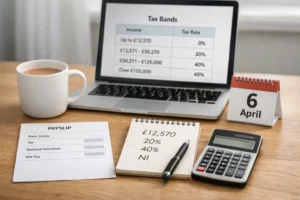Navigating the UK tax system can be complex, but understanding tax-free allowances is crucial for effective financial planning. These allowances can help reduce your taxable income, ensuring you keep more of your hard-earned money. In 2025, several updates and insights can significantly impact taxpayers, so let’s dive into the key details.
Table of Contents
ToggleWhat Are Tax-Free Allowances?
Tax-free allowances refer to the amount of income you can earn before you are required to pay taxes. They apply to various income sources such as salaries, pensions, savings, and investments. Understanding these allowances can help you maximise your savings and avoid unnecessary tax payments.
Key Tax-Free Allowances for 2025
Understanding key tax-free allowances in 2025 is essential for effective financial planning and reducing your tax liabilities. These allowances provide opportunities to optimise savings across various income sources, from personal earnings to investments and savings.
1. Personal Allowance
The standard personal allowance for 2025 remains at £12,570 for most taxpayers. This allowance applies to individuals earning up to £100,000 annually. For incomes exceeding this threshold, the allowance tapers off by £1 for every £2 earned above £100,000.
2. Marriage Allowance
Couples can benefit from the Marriage Allowance, allowing one partner to transfer up to 10% of their unused personal allowance to their spouse, provided they are a basic rate taxpayer. This could save couples up to £252 in 2025.
3. Savings Allowances
- Personal Savings Allowance: Basic-rate taxpayers can earn up to £1,000 in savings interest tax-free, while higher-rate taxpayers enjoy a £500 allowance.
- ISA Contributions: Savings in ISAs (Individual Savings Accounts) remain tax-free. The ISA allowance for 2025 is capped at £20,000.
4. Dividend Allowance
The tax-free dividend allowance in 2025 is £1,000. Investors earning dividends should plan carefully to maximise this benefit and minimise tax liabilities.
5. Capital Gains Tax (CGT) Allowance
The CGT allowance has been reduced to £3,000 for 2025. This affects individuals selling assets such as property or shares, highlighting the importance of timing and strategic tax planning.
Tax-Free Income Sources to Explore in 2025
- Rent a Room Relief: Earn up to £7,500 per year tax-free by renting a furnished room in your home.
- Trading Allowance: Small traders can make up to £1,000 annually from side hustles without incurring taxes.
- Gift Allowance: Gifts up to £3,000 per tax year are exempt from inheritance tax.
Strategies to Maximize Tax-Free Allowances
- Plan Early: Use allowances like ISAs and pension contributions before the tax year ends.
- Split Income: Couples can split income to take advantage of individual allowances.
- Track Your Finances: Use tax-efficient tools and software to monitor your income and benefits.
Changes to Watch in 2025
With evolving tax laws, keeping updated is essential. Potential reforms or adjustments to tax-free allowances may impact your financial strategy. Ensure you review HMRC announcements or consult a tax advisor to stay informed.
People Want to Know:
Here are some frequently asked questions people want to know about their tax-free allowances
How do tax-free allowances reduce my taxable income?
Tax-free allowances are the portions of your income that are exempt from taxation. By utilising these allowances, you can lower your overall taxable income, meaning you’ll pay less in taxes. For instance, the personal allowance of £12,570 lets you earn this amount without paying income tax.
Can I claim multiple tax-free allowances at the same time?
Yes, you can combine various allowances, such as the personal allowance, savings allowance, and dividend allowance, to minimise your tax burden. However, the eligibility criteria and limits for each allowance must be met. For example, you can use your personal savings allowance alongside your ISA contributions for tax-free savings growth.
What happens if I don’t use my tax-free allowances?
Most tax free allowances, like the personal allowance, are automatically applied by HMRC. However, some allowances, such as the marriage allowance or trading allowance, require a claim. If you don’t claim them within the tax year, you may lose the opportunity to benefit from those tax savings.
Conclusion
Understanding tax-free allowances is a powerful tool for managing your finances in the UK. From personal allowances to specialised reliefs, these exemptions can significantly reduce your tax burden. Stay informed, plan strategically, and take advantage of every opportunity to optimise your tax position in 2025. If you’re unsure how to make the most of these allowances, consider consulting us for personalised advice.





